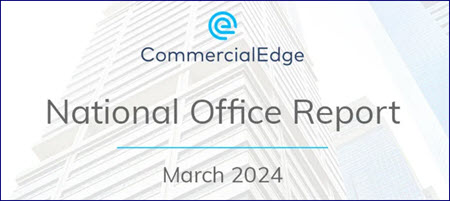
Recent media reports show the U.S. commercial real estate office market continues to adapt to pressures from remote work, increased vacancy rates, and difficulties with price discovery.
Building Value and Rent
- On March 26, the Wall Street Journal cited CoStar data showing that average U.S. asking office rents rose despite lower office demand and more empty space.
- David Bitner, the head of global research for Newmark told the Journal that if rents were cut to fill empty space, it “would significantly reduce the appraised values of their buildings. This in turn could lead to a covenant default on their loans or at minimum would make it harder for them to refinance.”
- The Journal noted that the value of office buildings will reset after owners and lenders manage to restructure mortgages or sell distressed properties. Another major influence on office rental rates is the adoption of new hybrid workplace arrangements by businesses that require less space. (Article: “The Office Market Is in Turmoil. So Why Are Rents More Expensive?”)
- According to an MSCI index, the average value of office buildings in central business districts fell nearly 41% from July 2022 to the beginning of this year. (Wall Street Journal, March 26)
- The New York Times reported on March 14 about the options facing municipal officials as nearly $3 trillion of outstanding commercial real estate debt is coming due by 2028 while tax revenues from commercial properties drop. The consequences of remote work and a post-pandemic shift in the use of the built environment are leading city officials to assess lower tax revenue assessments and consider policy changes to incentivize commercial-to-residential conversions, cutbacks to local services, or raise taxes.
Vacancy Rates Increase
- Commercial Edge’s National Office Report reported on March 22 that there was a noticeable adjustment in demand for office spaces in the first two months of this year, partly due to the ongoing shift towards remote and hybrid work models. These challenges were exacerbated by higher interest rates and ongoing economic uncertainties that put pressure on upcoming maturing loans.
- The report also shows that the national office vacancy rate is 17.9 percent, up 140 basis points year-over-year. It also stated that San Francisco’s vacancy rate climbed 480 basis points year-over-year to 23.4 percent.
Government Remote Work

- For public buildings, the influence of return-to-office trends on federal employees was reflected in the $1.2 trillion government funding package recently signed by President Biden. (Reuters, March 23 | Roundtable Weekly, March 22)
- The fiscal 2024 measure included six new requirements for agencies to report data about federal telework, return-to-office trends, and use of federal office space. (Federal News Network, March 21)
- Roundtable President and CEO Jeffrey DeBoer has consistently emphasized that federal policies promoting remote work undermine the health of cities, local tax bases, and small businesses. The Real Estate Roundtable has urged President Biden and national policymakers to end government policies that encourage remote working arrangements for federal employees. (RER letter to President Biden, Dec. 2022; RER letter to Senate, April 2023)
Mr DeBoer, speaking last week in Nashville at the Pension Real Estate Association (PREA) conference, noted that office vacancy rates are a bit misleading given the significant number of aging and obsolete building that do not functionally meet modern tenant demands. The Roundtable continues to urge incentives to encourage the conversion of these buildings to much-needed housing.
# # #



